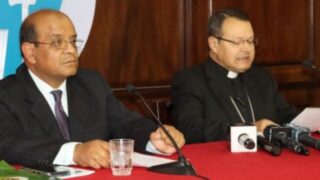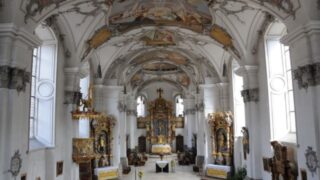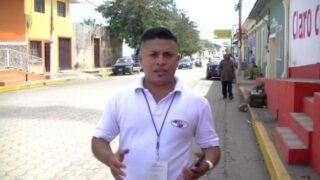Pressure on China’s Catholic conscientious objectors to join the Patriotic Church continues, as churches are shut, priests hunted down, congregations intimidated.
by Zhao Mingzhe
Two years after the signing of the Vatican-China Deal of 2018, the persecution of those refusing to join the Chinese Patriotic Catholic Association (CPCA) continues unabated. Disregarding the Vatican Guidelines of 2019, which allow priests and bishops of what was known as the Underground Catholic Church to remain outside the CPCA for reasons of conscience, the CCP persists on forcing all Catholics in China to be controlled by it.
An unregistered Catholic church in the Diocese of Mindong in the southeastern province of Fujian was forcibly closed down last November because its priest refused to join the CPCA. Since then, the congregation continued to meet in secret in an iron-sheet house they built with their money. A church member told Bitter Winter that on January 24, government personnel stormed into their makeshift church while believers were singing hymns and praying. They threatened to demolish the house if the congregation met again.
The churchgoer explained that the priest had to leave town and go into hiding after the church was shut last year. Still, the local police continued looking for him, offering monetary rewards to residents to report on him during the coronavirus outbreak. They threatened to implicate the families of those who were found sheltering the priest.
The believer thinks that the government wanted to use the priest’s influence to “round up the congregation like sheep and take them to the CPCA” and then get rid of him. “These are the tricks the Communist Party employs,” he added. “They attack and accuse priests of various crimes, claiming that they disobey the state, refuse to comply with laws and regulations. Those priests who refuse to join the CPCA are sure to be persecuted. I’m disgusted with the government’s behavior. They installed surveillance cameras inside and outside government-run churches. Only approved priests are allowed to hold Mass, those who are not are prohibited from even entering churches.”
“We will come under the government’s control if we join the CPCA,” the believer continued, “and priests will have to preach about national policies, laws, and regulations. The nature of our faith will be changed completely. There has never been a unity of government and religion. The CCP aims to make us believe in it while prohibiting our faith in God.”
According to the Statement of Responsibility for the Goal of Religious Work in 2019, issued by the government of a locality in Fujian, local authorities must continue to ramp up efforts to control and suppress the unregistered Catholic Church. All religious activities are not only to be restricted and banned, but each clergy member in these places of worship should be “transformed through education” by specially designated personnel.
Catholics refusing to join the CPCA in the Diocese of Yujiang in the southeastern province of Jiangxi are also similarly persecuted.
In July and August last year, Fuzhou city government officials raided an unregistered Catholic church, which the congregation disguised as an ancestral hall—a traditional venue in rural China where families pay tribute and offer sacrifice to their predecessors. They ordered to empty the church, threatening to destroy it if the congregation disobeyed and gathered there again. Church’s religious symbols were replaced with the slogan “Do Not Forget the Original Intention; Keep the Mission in Mind” and other propaganda posters.


Since then, congregation members have been meeting in secret in believers’ homes. But even these clandestine gatherings were banned after the local government found out about them. Believers became apprehensive about hosting meetings at home because the authorities threatened to fire their family members and deprive their children of opportunities to go to school or seek employment.


“By prohibiting religious activities and education of believers, the government intends to wear us down step by step, make our belief perish,” a priest form an unregistered church in the Yujiang Diocese told Bitter Winter. “We hope that the Pope will not believe CCP’s one-sided statements and listen to what members of unregistered churches say. If we join the CPCA, our belief will become impure.”
During the coronavirus outbreak, authorities throughout China continuously suppressed unregistered Catholic churches on the pretext of substandard sanitary or fire control measures. They pressured congregations to comply with all government requirements, including joining the state-run church, threatening to shut down their venues otherwise.
“Officials try to find faults with churches, inspecting every aspect of their activities,” commented a member of an unregistered church in Wengyang, a sub-district of Yueqing city in the eastern province of Zhejiang. “They even check if dining rooms have disinfection cabinets to sterilize tableware, or how many trash bins a church has. But what the government really wants is to compel us to join the CPCA and subject us to its control.”









